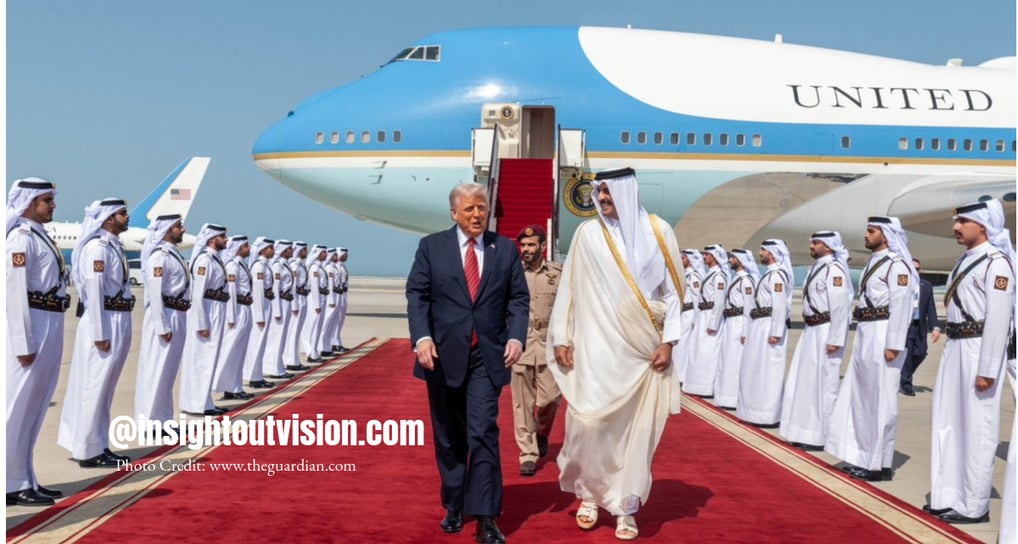Hidden Connections – From 9/11 to Qatar’s Jet: Is Trump’s Middle East Play a Dangerous Game?
5/19/20253 min read


Hidden Connections – From 9/11 to Qatar’s Jet: Is Trump’s Middle East Play a Dangerous Game?
Category: Big Picture Perspectives
Sub-Category: Hidden Connections
Date: May 15, 2025
At first glance, the events of September 11, 2001, and a $400 million Boeing 747-8 jet gifted by Qatar to President Donald Trump in 2025 seem worlds apart. But when we connect the dots, a troubling pattern emerges—one that ties historical tragedy to modern geopolitics, business deals, and ethical questions. What does it mean when a U.S. president, once vocal about 9/11’s perpetrators, now accepts lavish gifts from a nation with ties to those same actors? Let’s unravel this hidden connection and ask: Is America’s leadership being compromised?
The 9/11 Puzzle: Who Was Behind It?
On September 11, 2001, 19 hijackers, 15 of whom were Saudi nationals, executed the deadliest terrorist attack on U.S. soil, killing nearly 3,000 people. The attacks, orchestrated by al-Qaeda’s Osama bin Laden, were later linked to Khalid Sheikh Mohammed (KSM), the mastermind who evaded capture for years. Declassified U.S. documents suggest Saudi government officials provided logistical support to the hijackers, though definitive proof of state sponsorship remains elusive. Qatar, a U.S. ally, has faced scrutiny for its financial ties to Hamas, which some sources claim indirectly aided KSM’s evasion through regional networks.
At the time, President George W. Bush’s administration focused on al-Qaeda and invaded Afghanistan, but critics argue it downplayed Saudi Arabia’s role to preserve diplomatic ties. The U.S. prioritized oil-rich alliances over full accountability, setting a precedent for geopolitical pragmatism.
Trump’s 9/11 Stance: Then and Now
In 2001, Donald Trump, a private citizen, was outspoken about 9/11. He claimed on TV interviews that the towers’ collapse seemed suspicious, hinting at deeper conspiracies without evidence. By 2016, as a presidential candidate, he criticized Bush’s handling of 9/11, accusing Saudi Arabia of complicity and promising to declassify documents. Yet, during his first term, Trump deepened ties with Saudi Arabia, praising Crown Prince Mohammed bin Salman despite human rights concerns. His rhetoric shifted from accountability to deal-making, exemplified by a 2017 $142 billion arms deal.
Trump’s Middle East Empire: Golf Courses and Villas
Fast forward to 2025, and the Trump Organization, run by Trump’s sons Eric and Donald Jr., is expanding aggressively in the Middle East. In Qatar, a $5.5 billion deal with Qatari Diar and Dar Global will build the Trump International Golf Club, Simaisma, featuring an 18-hole course and luxury villas. Similar projects are underway in Saudi Arabia (a Jeddah tower) and the UAE (a Dubai hotel). These deals blur the line between Trump’s personal wealth and U.S. foreign policy, especially as they coincide with his Middle East tour in May 2025, aimed at securing $1 trillion in investments.
The Qatari Jet: Gift or Grift?
The most alarming development is Qatar’s offer of a $400 million Boeing 747-8 to serve as Air Force One until 2029, after which it will transfer to the Trump Presidential Library Foundation. Trump calls it a “great gesture” and a “transparent” deal, but ethics experts disagree. The U.S. Constitution’s Foreign Emoluments owe clause prohibits federal officials from accepting gifts from foreign states without Congressional approval. Critics, including Democrats like Chuck Schumer and Jamie Raskin, call it “bribery in broad daylight.”
Qatar’s ties to Hamas, estimated at $1.8 billion since 2007, raise red flags. Posts on X even claim Qatar’s funding helped KSM evade capture, though evidence is inconclusive. Accepting a gift from a nation with such ties, especially one enriching Trump’s family, raises questions about influence and national security. As ethics professor Richard Briffault notes, gifts are “designed to create good feelings” and expect reciprocity, like favorable policies or weapons deals.
From Superpower to Pawn?
The U.S., once the world’s unchallenged leader, now appears played by Gulf states wielding wealth and influence. Trump’s acceptance of the jet, coupled with his family’s business ventures, suggests a presidency prioritizing personal gain over national interest. In 2016, Trump criticized foreign donations to the Clinton Foundation as corrupt; now, he embraces a gift far exceeding those sums.
What’s next for America? If this trend continues, the U.S. risks becoming a client state, beholden to foreign powers with conflicting agendas. The erosion of ethical norms could embolden other nations to offer similar “gifts,” further compromising sovereignty. The 9/11 legacy, once a call for justice, now seems overshadowed by pragmatism and profit.
Thought-Provoking Questions
Does accepting Qatar’s jet violate the public’s trust, or is it a savvy deal for the U.S.?
How can the U.S. balance economic ties with Middle Eastern nations against ethical and security concerns?
What does Trump’s shift from 9/11 critic to Middle East dealmaker reveal about his priorities?
Share your thoughts in the comments or on X. Let’s connect the dots together.
Explore deep insights on current events and growth.
Vision
Truth
hello@insightoutvision.com
+1-2236036419
© 2025. All rights reserved.
